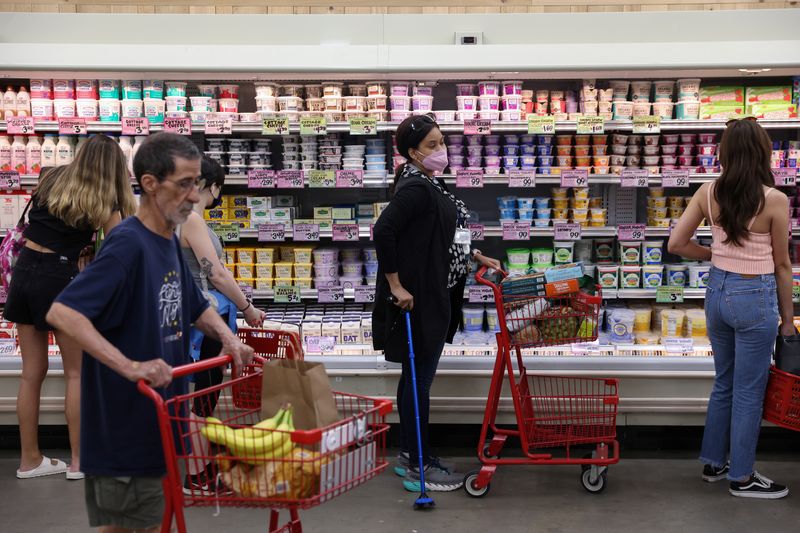By Richa Naidu and Jessica DiNapoli
LONDON/NEW YORK (Reuters) -Top U.S. and European investors are flagging their concerns about high prices to consumer goods companies, with Janus Henderson going so far as to cut some stakes it holds and shorting food makers it believes are at risk of losing customers.
The industry, which is due to report second quarter earnings in the coming weeks, has sharply hiked prices for over two years to make up for soaring cost inflation that started with the COVID pandemic and worsened due to shortages triggered by Russia's invasion of Ukraine and extreme weather.
In the U.S., consumer prices rose 3% in the 12 months ending in June, the smallest year-over-year increase since March 2021, while food inflation in the euro zone stood at 12.5% in May.
Consumer goods makers say the price hikes are necessary, and that they have taken a hit to margins over the past two years. Some companies such as Clorox (NYSE:CLX) have even begun to ease off the hikes to protect sales volumes as input costs fall. Janus Henderson, one of the world's top investors with over 250 billion pounds ($322.45 billion) in assets under management, said it had already cut stakes in some food companies because continued high prices could prompt a sharp fall in volumes they sell. "In the U.S. in particular, these pressures are more acute than in Europe," Janus Henderson portfolio manager Luke Newman told Reuters. "There's a very real risk of volume falls, which could be very dramatic in terms of revenue for these companies." In particular, the asset manager is scrutinizing food manufacturers, including cereal makers, Newman said.
"We've reduced our holdings to those categories and actually initiated some short positions as well," he said.
Other investors, including Richard Marwood, a senior fund manager at Royal London Asset Management, also said they were talking to consumer goods firms about the impact of high prices on volumes.
San Francisco-based Parnassus Investments has been discussing trimming its stakes in companies making household staples because the asset management firm expects revenues to "decelerate," said Robert Klaber, a portfolio manager.
Parnassus holds shares of P&G and Triscuit maker Mondelez (NASDAQ:MDLZ), among other consumer products makers and retailers.
In the U.S., some investors are worried that cuts to the food stamps program for low-income earners and the reversal of the Biden administration's student loan forgiveness plan will bite into consumers' spending power.
U.S. consumer strength has begun weakening, "and that's bad news for the consumer companies," Barclays (LON:BARC) analyst Iain Simpson said.
TRADING DOWN
With raw material and energy costs soaring over the past two years, companies have minimized damage to profits and margins largely by passing them on to retailers and shoppers.
Still, cost inflation has chipped away at margins, which have broadly fallen 2-4 percentage points over the past two years for the consumer goods industry. But, for some, they remain at a healthy 16-18% rate. Price increases have in many cases come at the expense of sales volumes, however, as shoppers "trade down" to cheaper private label alternatives and smaller pack sizes.
On average, median reported prices at the world's top 30 consumer goods companies rose 11.2% in the fourth quarter of 2022, according to restructuring consultancy Alvarez & Marsal, while median sales volumes were down about 2%.
Sales volumes fell nearly 5% in the household & personal care sector - where Procter & Gamble (NYSE:PG) is No.1 - while food, beverages and alcohol showed less dramatic declines.
'GREEDFLATION' ACCUSATIONS
Some lawmakers and regulators in the United States and Europe have accused consumer goods manufacturers and retailers of price gouging and "greedflation", or padding revenues by charging more than they need to recoup high input costs.
David Chavern, CEO of the Consumer Brands Association, a trade group that counts P&G and Clorox among its members, in response, says the industry has "contended with a stream of unprecedented inflationary pressures" since the pandemic.
"The resulting domino effect has spurred waves of impacts on consumer costs that have been mischaracterized by some," he said. "The reality is that our economy is still in a settling period, not a deflationary one, that the industry is carefully navigating as it continues working tirelessly to meet consumer demand."
The issue is an important one, and one for investors to talk to companies about since "greedflation" prioritises short-term profit over long-term consumer loyalty and sales, said Stephanie Niven, portfolio manager of the Ninety One Global Sustainable Equity Fund.
"Relationships with consumers are coming under scrutiny, perhaps into jeopardy and the long term competitive advantage of that business, particularly if it rests on consumer brand loyalty, can be very problematic," said Niven.
Irene Jensen, portfolio manager at Norway's sovereign wealth fund, Norges Bank Investment Management, said she believes "there are some companies who have probably been a bit opportunistic" and the perception of price gouging is "potentially harmful."
"The risk now is that the consumer down-trades into private label, gets to test out these products and then discovers that they're as good as the brands or good enough for them," Jensen said, adding that her team had raised concerns with companies.
Other asset managers argue the accusations of opportunistic price hikes are unmerited.

"We will have to wait a few months or quarters till we know who's right," said Thomas Joekel, a portfolio manager at Unilever (NYSE:UL) and Reckitt top-20 shareholder Union Investment, arguing that falling margins at companies were proof that they were not gouging consumers.
($1 = 0.7753 pounds)